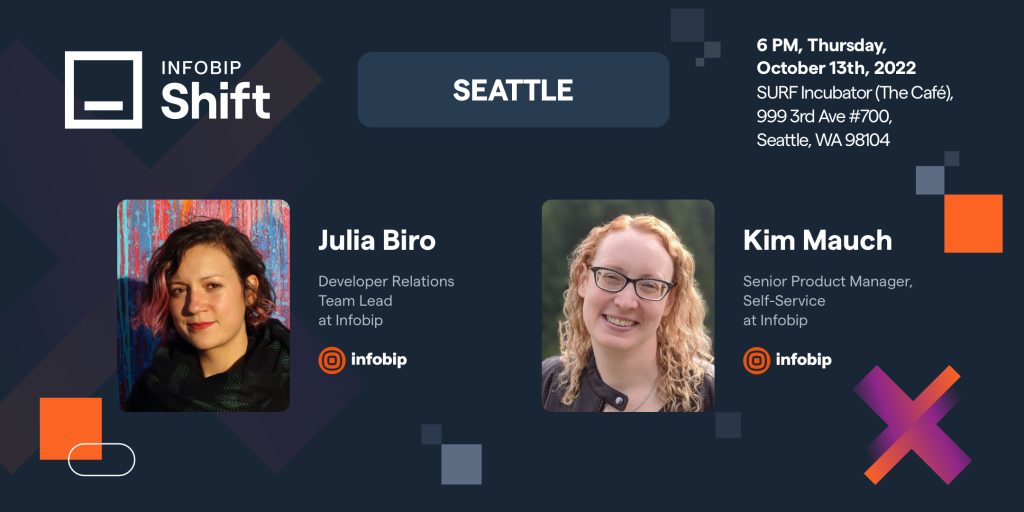Infobip Shift Conference has successfully been gathering the global community for over a decade, but now it’s time to flip the script. Join us for the first Infobip Shift meetup in Seattle on October 13th!

The Shift team wants to meet more local developer communities, so Shift is going on the road across Northern America, and one of the first stops is Seattle, home of Amazon, Microsoft, Dell, and many other great technology companies.
One of the speakers at the Seattle meetup is Kim Mauch, Senior Product Manager at Infobip. She will talk about product discovery from an engineering perspective. Her core message is how product discovery is a popular topic in product management, but it can also be a powerful tool for engineers, says Kim:
We’ll talk about what product discovery is, and why it’s so important that engineering participates in the process.
Kim will share a few real-life examples of how engineers can contribute to better results through discovery, but for now, to pick your brain, Kim has revealed her keys to a good product discovery:
Preparation makes use of limited time
We need good preparation. That will ensure the time you spend in discovery is spent well. For customer interviews, they usually only have a set amount of time to talk to the customer, explains Kim. That is why preparation is important. By preparing in advance, you can make the best use of the limited time available.
Discover more by letting the customer lead
Second, keeping a curious mindset during customer interviews and allowing the discussion to flow is critical. It can be comforting to stick to a script, but sometimes you can find gems by letting the topic go where the customer leads. Kim advises asking lots of open-ended questions and keep digging to find the core needs the customer is trying to express. Having multiple people participate or watch these interviews can help pick up on those needs from different perspectives.
Share your findings with your team
Last, but not least, it’s important for the team to collect their findings, and share them with the entire team. Usually, this means creating a shared document or virtual whiteboard with the findings. Then you can combine the findings from multiple discoveries to help guide the roadmap.
What are some common mistakes in product discovery?
Kim points out that the easiest mistake that engineers and product people make is to “outsource” discovery.
Product, engineering, and UX teams are very busy, so it can be easy to rely on what you hear from others inside the company rather than going to customers or prospects directly.
A lot can be learned from listening to customer-facing teams like account management and customer success, but they don’t always paint a full picture:
Hearing directly from the customer helps the core product team develop a better understanding and empathy for customer pain points.
Another common mistake is not sharing the results widely. The product engineering team and the product and UX teams across the company should have access to and learn from each customer interaction. Many times the findings from discovery can be applied across multiple teams in the company.
Alongside Kim, Infobip’s Developer Relations Team Lead Julia Biro will introduce us to The Hitchkier’s Guide to MFA. In the same way the mechanic’s car is always broken, many devs fall short regarding password security and authentication, Julia explains. How does she know that? Well, she was one of them. Because of that, Julia’s talk will focus on points where most people fall short:
Let’s see what options we have for improving the situation— whether for ourselves or for the users of the apps we build.
Learn more about product discovery and MFA with us at the Infobip Shift Seattle Meetup on October 13th!
